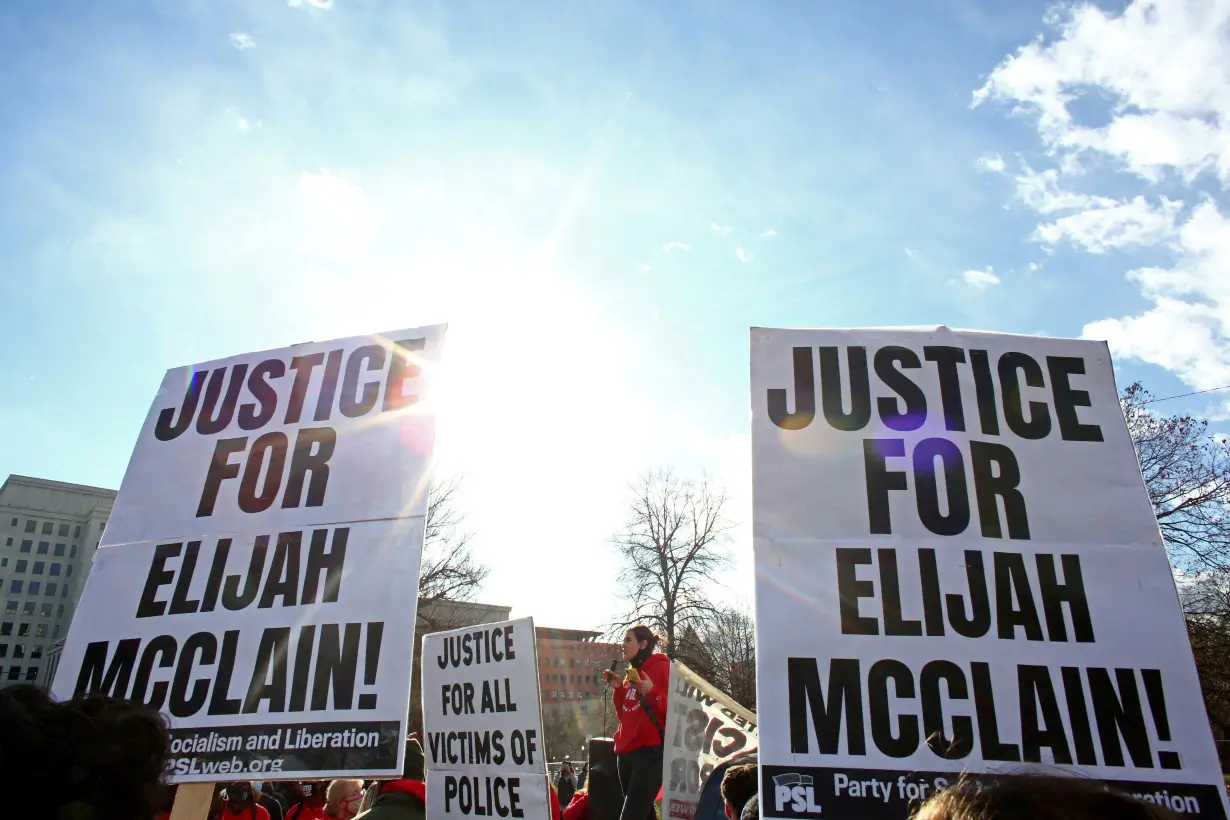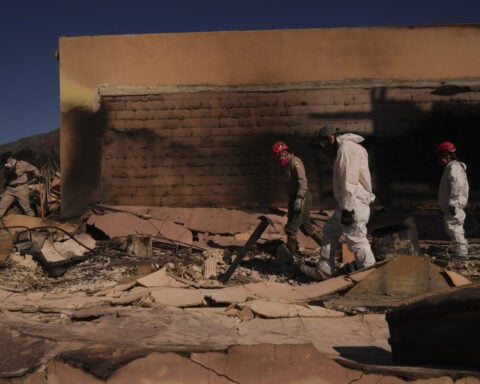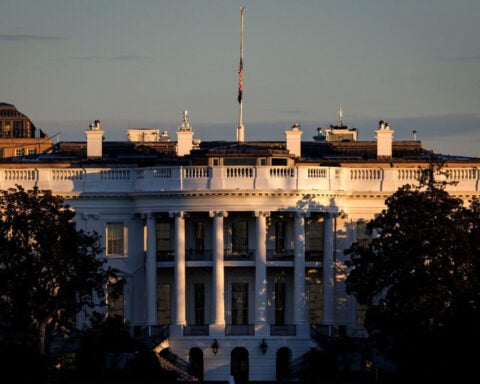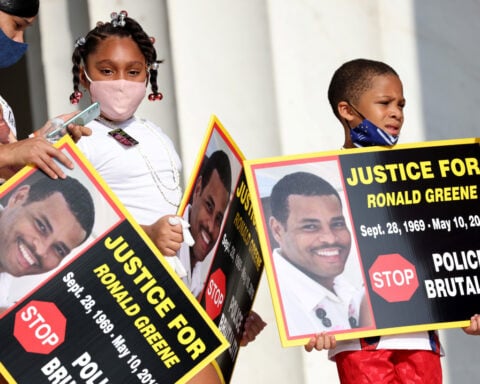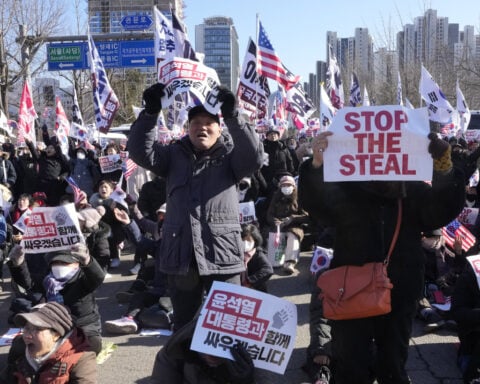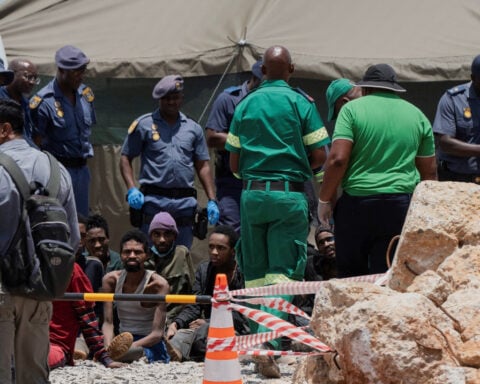By Brad Brooks
LONGMONT, Colorado (Reuters) - A Colorado prosecutor on Tuesday told jurors that two officers charged with manslaughter in the killing of Elijah McClain repeatedly and unreasonably assaulted the young Black man who died after a police stop in 2019.
Defense attorneys, though, said others were to blame, including medical responders and even McClain himself.
Prosecutor Duane Lyons told jurors in his closing argument the officers made no attempt to moderate their encounter with McClain as their training dictated. Officers Randy Roedema and Jason Rosenblatt are charged with reckless manslaughter and second-degree assault. The state attorney general's office appointed Lyons after a local prosecutor declined to prosecute.
"They chose to see violence where there was none," Lyons said. "They chose to use violence instead of de-escalating."
Lyons showed the jurors body camera footage of the "repeated assaults" police inflicted on McClain, 23.
"To say this is just a tragedy would be to trivialize what happened that evening," Lyons added. "The defendants are guilty of crimes."
But Don Sisson, a defense attorney for Roedema, in his closing argument portrayed McClain, who weighed 140 pounds, as violently resisting the police, saying that justified their response. He said that McClain was still alive and responsive when the officers handed control of him off to paramedics, and that the medics were solely responsible for injecting the fatal dose of ketamine.
"Just because there's a tragedy does not mean there's criminality," Sisson told jurors. "You cannot use your emotion to guide your decision."
In the first of three trials in the McClain case, prosecutors have argued that officers Roedema and Rosenblatt unnecessarily brutalized McClain when they stopped him and that they gave false and incomplete information to paramedics which contributed to the medical workers administering a large dose of the sedative ketamine.
Defense attorneys argued it was the ketamine that killed McClain, and that paramedics were solely responsible.
A revised autopsy report in September 2022 concluded McClain died from "complications of ketamine administration following forcible restraint."
A bystander had called 911 to report that McClain was acting suspiciously as he walked home from a convenience store on Aug. 24, 2019, in the Denver suburb of Aurora. McClain, dressed in a winter coat and face mask on a warm night, was listening to music using ear buds and dancing slightly as he walked, security videos showed.
Rosenblatt, Roedema and a third Aurora police officer arrived and grabbed McClain nine seconds after confronting him, according to body camera footage showed by prosecutors. A struggle ensued.
The footage does not show McClain grabbing for a gun, but Roedema can be heard yelling that McClain tried to get Rosenblatt's weapon. Harvey Steinberg, Rosenblatt's defense attorney, said during closing arguments that it was reasonable for his client to act on that warning. Prosecutors say McClain did not grab for a gun.
The officers put McClain in a "carotid" chokehold at least twice and held him down for 15 minutes until medics arrived.
The episode initially received little media attention, but the case gained more notice following the May 2020 killing of George Floyd, a Black man who died at the hands of Minneapolis police. Floyd's death sparked international outrage and fueled protests against racial injustice and police brutality.
The joint trial for Roedema and Rosenblatt opened on Sept. 20. Roedema was suspended from the Aurora police pending the outcome of the case, while Rosenblatt was dismissed.
The manslaughter trial for the third officer, Nathan Woodyard, is set to open on Friday. Two paramedics are expected to face trial next month.
The pathologist who conducted McClain's autopsy, who was among medical and security expert witnesses called, testified that he could not say with certainty if the police chokehold and restraint of McClain contributed to his death.
Defense attorneys rested their case without calling any witnesses. The defendants did not take the stand.
(This story has been corrected to fix the last name of Don Sisson in paragraphs 7 and 8)
(Reporting by Brad Brooks in Longmont, Colorado; Editing by Donna Bryson, Matthew Lewis, Rod Nickel and Josie Kao)

 Germany sees meat exports to EU continuing after foot-and-mouth case
Germany sees meat exports to EU continuing after foot-and-mouth case
 Parliament speaker to lead Taiwan delegation to Trump's inauguration
Parliament speaker to lead Taiwan delegation to Trump's inauguration
 German economy contracted 0.2% in 2024
German economy contracted 0.2% in 2024
 Middle East latest: Palestinian prime minister says Palestinian Authority should run Gaza in future
Middle East latest: Palestinian prime minister says Palestinian Authority should run Gaza in future
 Nokia signs multi-year patent license agreement with Samsung
Nokia signs multi-year patent license agreement with Samsung
 Irish parties secure 'comfortable majority' for new government
Irish parties secure 'comfortable majority' for new government
 Bayern Munich signs US youngster Bajung Darboe from LAFC
Bayern Munich signs US youngster Bajung Darboe from LAFC
 Novak Djokovic breaks a tie with Roger Federer for the most Grand Slam matches in tennis history
Novak Djokovic breaks a tie with Roger Federer for the most Grand Slam matches in tennis history
 China's RedNote: what you need to know about the app TikTok users are flocking to
China's RedNote: what you need to know about the app TikTok users are flocking to
